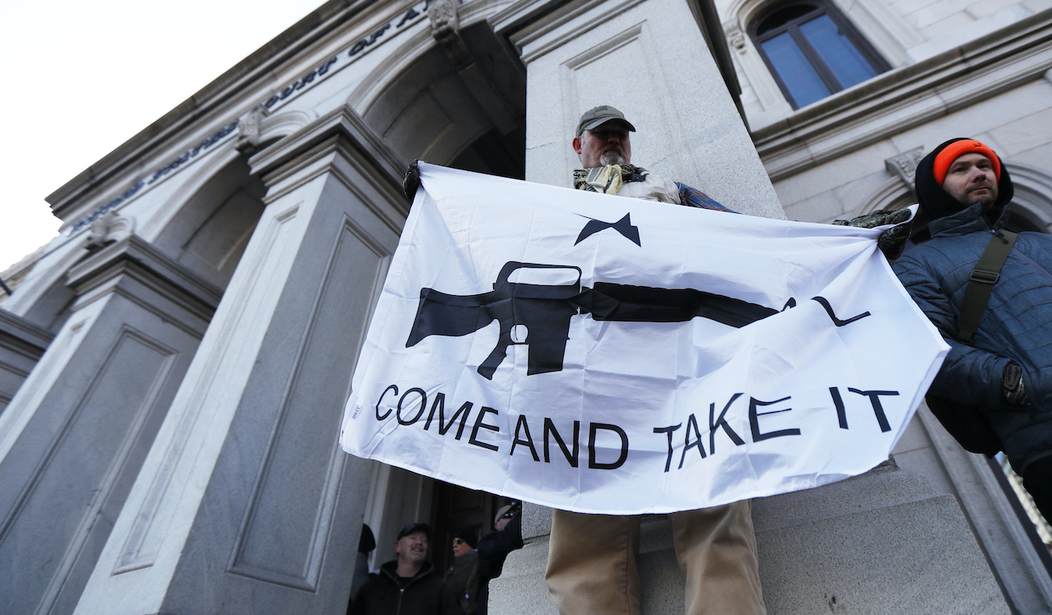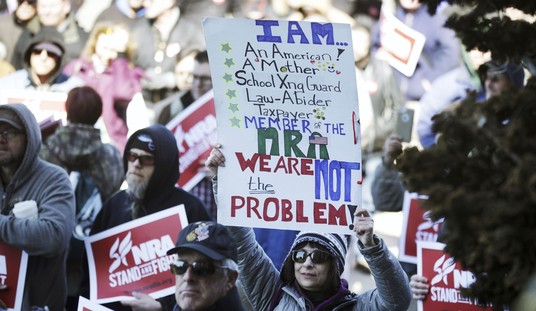The first big moves on gun control from the Biden administration will likely come as early as next week with House Democrats set to push forward on several anti-gun measures, but the pro-Second Amendment response is already starting to appear at the local level in communities around the country.
On Tuesday evening, the sheriff of Wicomico County in Maryland bypassed the county commission and declared that, as long as he’s in office, the county will be a Second Amendment Sanctuary. Sheriff Mike Lewis said during the meeting of county commissioners that he’s “trying to do what’s right for the law abiding, lawful gun owners in this county,” and that he stands by his decision “150%.”
Sheriff Lewis says as long as he’s in office, “my [his] commitment is that I will stand in front of them [citizens of Wicomico County] and make sure their second amendment rights are not violated or further infringed upon or encroached upon.”
In Pennsylvania, the mayor of Lehighton is asking the borough’s council to approve a Second Amendment Sanctuary ordinance.
Mayor Clark Ritter told borough council on Monday the resolution was started up by Brandon Bell.
Bell, a Jim Thorpe native, is the lead coordinator of the movement and has visited various boroughs and townships asking government officials to consider adopting an ordinance that typically rejects the enforcement of state or federal gun laws sensed to violate the Second Amendment.
Bell, a U.S. Marine Corps veteran, started a petition on the Change.org website that had over 1,500 signatures as of this morning.
Ritter noted that both Palmerton and Bowmanstown have approved resolutions to have their respective boroughs listed as a Second Amendment sanctuary.
He cited proposed federal laws H.R. 127 and H.R. 130 as causes for concern.
“My opinion on this is it’s a way of trying to eliminate the Second Amendment,” Ritter said. “I’m afraid for my grandkids and their kids because the way things are going, it’s not good.”
Earlier this week, the Twin Falls, Idaho approved a similar resolution, though in this case it wasn’t specifically about the Second Amendment.
County commissioners signed a resolution Tuesday reaffirming their support for the Constitution after a group of residents urged the board to publicly back the Second Amendment.
Residents rallied in front of City Hall on Thursday to encourage local elected officials to show their support for the right to bear arms as the federal government mulls gun-related legislation.
Cities and counties throughout Idaho, and the rest of the country, have passed resolutions over the last year declaring themselves as “Second Amendment sanctuaries.” In the Magic Valley, both Hagerman and Gooding have passed such resolutions, while other municipalities have opted not to.
Commissioner Jack Johnson said the county wanted to avoid using the term “sanctuary” given the controversial nature of the title. But commissioners wanted to move forward with a resolution that reaffirms the oath they took when elected into office to uphold the Constitution.
While the resolution outlines the county’s support for the Constitution as a whole, it also includes a few paragraphs specifically related the Second Amendment.
These paragraphs list the sorts of legislation changes the county would be opposed to, such as a ban or tax on “firearms, magazines, ammunition or accessories necessary to citizens of Twin Falls County for defense of life, liberty, and property.”
It’s great to see that the local, grassroots efforts to protect Second Amendment rights are still bearing fruit. Even better, however, is the fact that the Second Amendment Sanctuary movement has now grown to the point that at least twelve states are currently considering legislation that would, at the very least, prohibit state and local governments from enforcing gun control laws that infringe on the right to keep and bear arms.
Gun control activists are worried enough that they’re now speaking out about the Second Amendment Sanctuary movement publicly. On Thursday, the Associated Press ran a long piece that begins with the objections by an Everytown for Gun Safety staffer.
Legislation in at least a dozen states seeks to nullify any new restrictions, such as ammunition limits or a ban on certain types of weapons. Some bills would make it a crime for local police officers to enforce federal gun laws.
That can create confusion for officers who often work with federal law enforcement, said Daniel Isom, a former chief of the St. Louis Police Department who is now a senior advisor for Everytown for Gun Safety. Federal law plays a big role in some areas, such as keeping guns away from domestic violence offenders.
Putting local officers in a position to decide which laws to enforce is the last thing police need at a time when cities such as St. Louis are experiencing a rise in violent crime, Isom said.
“This has been an extremely challenging year for both communities and law enforcement, and to ask any more mental strain on officers at this point in time seems to be quite displaced,” he said. Gun sales also have set monthly records nationwide since the coronavirus pandemic took hold.
Isom is concerned about a Missouri measure passed by the state House that would allow police departments with officers who enforce federal gun laws to be sued and face a $50,000 fine. It’s not the first time Missouri has considered such a bill, but supporters pointed to President Joe Biden taking office as a reason to pass it now.
“The main issue there is the Supremacy Clause,” the part of the Constitution that says federal law supersedes state law, said Jacob Charles, executive director of the Center for Firearms Law at Duke Law School. Even so, the bills focused on what local police can and can’t do could pass legal muster.
“States have no obligation to enforce federal law,” he said.
Not just states. Localities have no obligation either. County sheriffs have no obligation to enforce any new federal gun control law.
This is a fundamentally important fact if we as Second Amendment activists want be as effective as possible. A pure Tenth Amendment challenge that seeks to nullify federal gun laws within the boundaries of a particular state isn’t of much use if it’s struck down by the courts. It might make sense to put a law like that on the books in one state to run it up the flagpole and see what the Supreme Court would say, but I wouldn’t expect much success trying to argue that states can ignore any federal law they don’t like.
As the Duke Law professor says, those laws that make it clear that the federal government will not receive any cooperation from state or local police in enforcing new gun control measures, on the other hand, are on solid legal ground, and they put Democrats in a tough spot. If a dozen or more red states adopt these policies, then that means by default these new laws will be enforced most frequently in blue areas of the country. Democrats are claiming to be the party of criminal justice reform at the same time they’re moving forward in creating new, non-violent, possessory firearm offenses that will put a disparate number of citizens who live under Democrat control behind bars and saddle them with a criminal record.
Some Democrats are already coming to the conclusion that maybe sweeping new gun control laws aren’t the way to go, but most of the party is still blindly following the Bloomberg bucks and the anti-gun movement. Not only are they likely to run up against some opposition from younger activists who don’t want to see anti-violence strategies that involve more policing and incarceration; they’re also going to have to deal with a bloc of states that have declared they’re not going to lift a finger to help enforce any new gun control measures.









